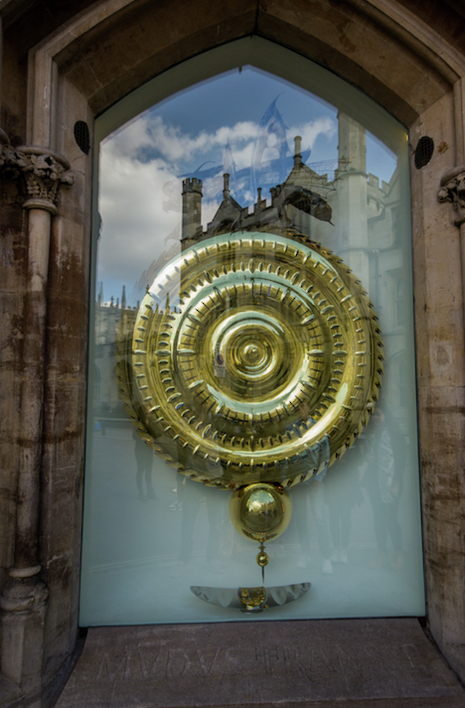Varsity explains: how does the Corpus Clock work?
Joseph Krol explains the ins-and-outs of the Cambridge attraction that has crowds gathered around in awe

The Corpus Clock is one of Cambridge's most unusual sights – not least for the massing tourists who so often block Bene't Street. Unveiled in 2008, its appearance is at once gaudy, refined, erratic, meticulous – it's certainly, at any rate, polarising. Built to the design of kettle entrepreneur (and Corpus alumnus) John Taylor, it has now confused passers-by for over a decade.
The ghastly insect that adorns the top of the clock was intended as a tribute to John Harrison, a great clockmaker who revolutionised horology with his introduction of the grasshopper escapement. His work was all done towards the determination of longitude, the east-west coordinate which was effectively impossible to calculate without a precise reading of the time. After decades of being cruelly ignored by much of the scientific establishment, in his old age King George III championed in his work, but much of his work still passed into obscurity.
Escapements form the central mechanism of all traditional clocks. After being wound, the escapement serves to push the pendulum slightly, with each swing moving the clock forward by a fixed amount. Since the pendulum's swings are necessarily of the same length, no matter how far out the pendulum swings, this period will stay the same, ensuring that the clock keeps good time. Before Harrison, most escapements were fairly crude. His invention, the grasshopper escapement, cut down massively on friction by using two pivoted arms, which give the impression of something creeping round the edge of the clock, hence the name.
It was never often used, being relatively technically involved to produce. While designing his clock, Taylor decided that he wanted to bring back an awareness of clockmaking to the masses, and so incorporated the escapement outside of the clock. As such, the 'Chronophage' on the top of the clock forms an integral part of its functioning, moving a shade around the clock through which LEDs shine through, marking the passing of the seconds.
However, the system is quite deliberately imperfect. As guides love to tell tourists, every so often the clock runs deliberately slowly; at other times the pendulum will stop altogether, or even begin to run backwards. It's only perfectly on time every five minutes; Taylor claimed that in this regard he wanted to reflect life's inherent irregularity.
He's very certain, though, on the meaning of the Chronophage, which literally means 'time-eater': "I view time as not on your side. He'll eat up every minute of your life, and as soon as one has gone he's salivating for the next."
 News / University Council rescinds University Centre membership20 February 2026
News / University Council rescinds University Centre membership20 February 2026 News / Hundreds of Cambridge academics demand vote on fate of vet course20 February 2026
News / Hundreds of Cambridge academics demand vote on fate of vet course20 February 2026 News / Cambridge academics sign open letter criticising research funding changes22 February 2026
News / Cambridge academics sign open letter criticising research funding changes22 February 2026 News / Union cancels event with Sri Lankan politician after Tamil societies express ‘profound outrage’20 February 2026
News / Union cancels event with Sri Lankan politician after Tamil societies express ‘profound outrage’20 February 2026 News / Judge Business School advisor resigns over Epstein and Andrew links18 February 2026
News / Judge Business School advisor resigns over Epstein and Andrew links18 February 2026








